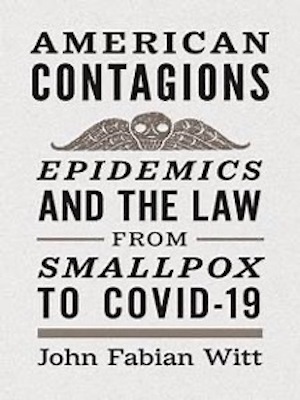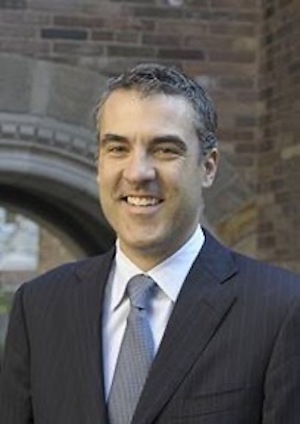Legal historian John Fabian Witt discusses new book on epidemics and law

“If the past is a guide, how our law responds to contagion now and in the future will help decide the course of our democracy.” —John Fabian Witt, American Contagions: Epidemics and the Law from Smallpox to COVID-19
At this writing, the COVID-19 pandemic has killed more than 570,000 Americans and infected about 32 million. The United States has the highest death toll in the world, and the death rates here betray stunning inequities for people of color, among other vulnerable and disadvantaged communities.
The experience of this novel pandemic in the past year has fueled questions about the role of the federal and state governments in addressing epidemics; the importance of public health versus individual freedoms; the inequities in access to health care and more.
To help address these concerns, John Fabian Witt, a professor of history and law at Yale University, has provided a comprehensive citizens’ guide to the history of law and epidemics with his recent book, American Contagions: Epidemics and the Law from Smallpox to COVID-19.
Witt explores how infectious diseases through our history have shaped the law and how law has shaped our response to these recurrent diseases. For the most part, since the inception of our nation, public health has held primacy over other interests, such as individual rights. Court decisions often reflected the principle set forth by the Roman scholar and lawyer Cicero more than two millennia ago: “Salus populi suprema lex esto.” (“The health of the people is the supreme law.”)
Witt teaches courses in American legal history, torts, history of the laws of war and legal historiography. He is the author of several other books, including Lincoln’s Code: The Laws of War in American History, which received the Bancroft Prize and American Bar Association’s Silver Gavel Award, and it was a finalist for the Pulitzer Prize. Witt responded in writing to a series of questions on his teaching and his new book.
 John Fabian Witt.
John Fabian Witt.
Robin Lindley: Did the COVID-19 epidemic spark your book or were you already working on this subject?
John Fabian Witt: The book took shape in the spring of 2020 as the pandemic set in. I retooled a section of my course on American Legal History to include a unit on the legal history of epidemics in the U.S. My boys and I sat at the dinner table; they did schoolwork on Zoom, as I wrote the book. We called it our Covid Coffee Shop.
Robin Lindley: As you note in your book, under our federal system, state and local governments bear the primary responsibility for dealing with public health under their “police power.” What is the role for the federal government and Congress in dealing with a nationwide epidemic?
John Witt: Great question, and we’ve seen a big reversal on this over two administrations now. It’s a tough question. On the one hand, the fact that germs don’t respect boundaries is a powerful argument for a centralized approach directed by the federal government. My brilliant Yale colleague Nicholas Christakis compares a decentralized approach to letting swimmers urinate in one corner of the swimming pool and hoping for the best. And of course, everyone recalls the period in which federal government inaction led states to be competing for one another for protective gear and ventilators. On the other hand, we’ve also had a powerful lesson in the dangers of centralized power. The Trump administration’s mix of malevolence and incompetence was a terrible recipe for pandemic management. Centralized power in public health, as in other domains, is a high-risk arrangement. Our decentralized approach functioned as insurance against the real risk of failure in Washington, D.C. Governors were able to adopt masking requirements, business closure mandates and gathering limits that almost certainly wouldn’t have come out of the federal government.
Robin Lindley: How do you see the national response to COVID-19 under the Trump administration?
John Witt: The true crisis for any president is the one they are least suited to manage. The pandemic was exactly that for the Trump presidency. We have a deep history of administration in public health in the U.S. Public health measures in the mid-19th century produced the modern administrative state. But the Trump administration was deeply resistant to expertise and suspicious of the civil service and the state. Of course, it’s always important to observe that lots of countries around the world struggled with the pandemic.
Robin Lindley: Our history shows that the courts usually uphold state efforts to protect public health in line with Cicero’s dictum that you note, “health of the people is the supreme law.” Yet, some recent U.S. Supreme Court decisions indicate that religious freedom trumps public health protections. What do you see in these recent decisions?
John Witt: If there’s one thing I would like readers to come away from my book with, it is that today’s courts have made a radically novel departure from the long history of judicial deference to public health officials. Going back at least to the time of Chief Justice John Marshall, courts have recognized that governments need to be able to protect the health of the people. Courts have played a role in shaping and channeling public health limits, sometimes ruling out the abusive uses of government power. But they have rarely if ever gotten in the way and blocked public health authorities from putting in place the measures they think important. The paradigm case has been Jacobson v. Massachusetts from 1905, in which the Supreme Court upheld mandatory smallpox vaccination. In the novel coronavirus pandemic, by contrast, state supreme courts in places like Wisconsin and Michigan struck down state Covid-19 limits. The Michigan decision was especially striking because it ruled the state’s emergency public health arrangements unconstitutional. At the U.S. Supreme Court, a series of religious freedom decisions starting just before Thanksgiving and accelerating (recently) have interposed individual rights against public health limits that, candidly, had colorable public health rationales.
Robin Lindley: You note that public health measures often have protected white populations while targeting or neglecting the powerless: the underprivileged, minority groups, immigrants and others. Are there examples of discrimination and public health that stand out for you?
John Witt: A classic and dreadful example is San Francisco at the turn of the 20th century, when local officials imposed a quarantine on Chinatown that was limited only to people of Chinese descent. Time and again, politically vulnerable populations have borne the brunt of the awesome public health powers of the state. There is a paradox here. Those powers are dangerous and awesome. But they are indispensable, too. The public health power Cicero talked about—“salus populi suprema lex”—is like the power of national self-defense. Terrible things can be and have been done in its name, even though we can hardly do without it.
Robin Lindley: What changes in law and policy would you suggest to protect citizens, particularly minority groups and other marginalized people, during an epidemic?
John Witt: Epidemics are paradigm cases for panicked public policy-making, and courts can play a valuable role in constraining the worst forms of arbitrary discrimination. The federal 9th Circuit Court of Appeals, for example, struck down the San Francisco plague quarantine of 1900. But today the most discriminatory features of the pandemic seem to arise out of socio-economic and health care inequalities. Until we have better systems for the provision of basic social goods like health care, income and housing, we will see poor Americans in vulnerable positions.
Robin Lindley: Do you have any closing thoughts for readers on the law and epidemics?
John Witt: One of the great challenges of the coronavirus pandemic is that it has revealed the limits of some of our most powerful and long-standing institutions. In the U.S., we rely on private property and markets to deliver all sorts of crucial social goods. People rely on markets to put food on their tables, keep a roof over their heads, and get medical care for themselves and their families. Such markets have considerable virtues. But the pandemic has made salient the limits of such markets in situations of public health risk. Collective risks press us to develop collective solutions. Think of the glorious democracy of New Haven’s pop-up vaccination clinics. Our private mechanisms have produced dreadful outcomes for the most vulnerable. Consider that our overall death rates are double those of comparable western European countries like Germany. Or consider that once we adjust for age, Black and Latinx people have accounted for twice as many deaths per capita as whites. Such disparities are a result of legal arrangements and policy choices. We can do better.
Editor’s note: A longer version of this interview first appeared on the History News Network website.
Robin Lindley is a Seattle-based writer and lawyer. He is the features editor for the History News Network. Lindley’s work also has been featured in the Writer’s Chronicle, Crosscut, Documentary, NW Lawyer, Real Change, the Huffington Post, BillMoyers.com, Salon.com and more. He has a special interest in the history of human rights and conflict. He can be reached by email at [email protected].



